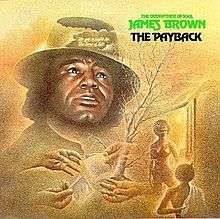The Payback
The Payback is the 37th studio album by American musician James Brown. The album was released in December 1973, by Polydor Records. It was originally scheduled to become the soundtrack for the blaxploitation film Hell Up in Harlem, but was rejected by the film's producers, who dismissed it as "the same old James Brown stuff." A widely repeated story—including by Brown himself—that director Larry Cohen rejected the music as "not funky enough" is denied by Cohen.[5] On the DVD commentary track for Black Caesar (to which Hell Up in Harlem is a sequel), Cohen states that executives at American International Pictures were already unhappy with Brown for delivering songs much longer than expected on Black Caesar and Slaughter's Big Rip-Off and opted for a deal with Motown Records instead. Cohen said the absence of Brown's music from Harlem still "breaks [his] heart."[6]
| The Payback | ||||
|---|---|---|---|---|
 | ||||
| Studio album by | ||||
| Released | December 1973 | |||
| Recorded | February–October 1973 | |||
| Genre | Funk[1] | |||
| Length | 72:52 | |||
| Label | Polydor | |||
| Producer | James Brown | |||
| James Brown chronology | ||||
| ||||
| Singles from The Payback | ||||
| ||||
| Review scores | |
|---|---|
| Source | Rating |
| AllMusic | |
| Robert Christgau | B+[2] |
| eMusic | |
| The Rolling Stone Album Guide | |
It went to #1 on the Soul Albums chart for two weeks and cracked the Pop Albums chart in the Top 40. It was Brown's only studio album to be certified gold.[7]
The Payback is considered a high point in Brown's recording career, and is now regarded by critics as a landmark funk album. Its revenge-themed title track, a #1 R&B hit, is one of his most famous songs and an especially prolific source of samples for record producers. Musically the album is largely cyclic grooves and jamming, but it also features departures into a softer soul-based sound on tracks like "Doing the Best I Can" and "Forever Suffering".
The album was reissued on CD in 1992 with liner notes by Alan Leeds.
Track listing
All tracks are written by James Brown, Fred Wesley and Charles Bobbit; except where noted:.
| No. | Title | Writer(s) | Length |
|---|---|---|---|
| 1. | "The Payback" | Brown, Wesley, John "Jabo" Starks | 7:39 |
| 2. | "Doing the Best I Can" | 7:42 | |
| 3. | "Take Some...Leave Some" | 8:33 | |
| 4. | "Shoot Your Shot" | Brown | 8:09 |
| 5. | "Forever Suffering" | 5:52 | |
| 6. | "Time Is Running out Fast" | 12:47 | |
| 7. | "Stone to the Bone" | Brown | 10:14 |
| 8. | "Mind Power" | 12:04 |
Note
- The track time for "Mind Power" is from the 1992 re-release of the album. The original 1973 version is 90 seconds shorter.
Personnel
- James Brown - lead vocals, electric piano
- St. Clair Pinckney - tenor saxophone, flute
- Maceo Parker - alto saxophone, flute
- Darryl "Hasaan" Jamison - trumpet
- Jerone "Jasaan" Sanford - trumpet
- Isiah "Ike" Oakley - trumpet
- Fred Wesley - trombone
- Hearlon "Cheese" Martin - guitar
- Jimmy Nolen - guitar
- Fred Thomas - bass
- John "Jabo" Starks - drums
- John Morgan - percussion
Charts
Album – Billboard (North America)
| Year | Chart | Position |
|---|---|---|
| 1974 | Billboard Pop Albums | 34 |
See also
- List of number-one R&B albums of 1974 (U.S.)
References
- Deming, Mark. "James Brown: The Payback > Review at AllMusic. Retrieved 21 September 2011.
- Christgau, Robert (June 9, 1980). "A Consumer Guide to James Brown". The Village Voice. New York. Retrieved April 29, 2013.
- Wolk, Douglas (November 23, 2010). "James Brown, The Payback". eMusic. Retrieved April 29, 2013.
- "The New Rolling Stone Album Guide - Nathan Brackett, Christian David Hoard - Google Books". Books.google.com. Retrieved 2015-07-19.
- Smith, RJ. The One: The Life and Music of James Brown, 290. New York: Gotham Books, 2012.
- Cohen, Larry (2001). Black Caesar commentary (DVD). Fox Video.
- "The James Brown Review". chronicle.augusta.com. Retrieved 2015-07-19.